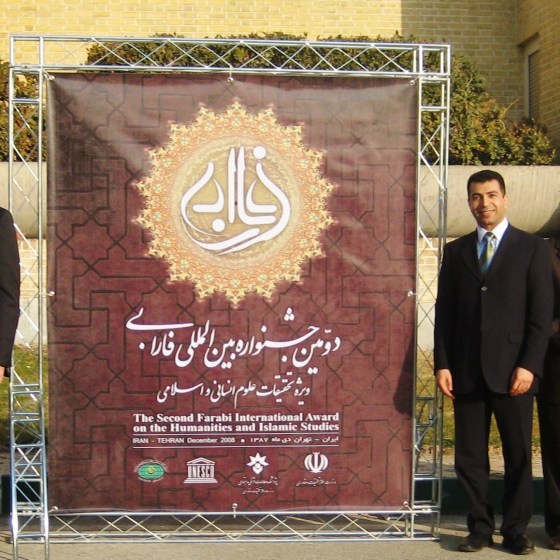Author Shafique Virani Flown to Iran as a Guest of State
“None of that people should be spared,
not even the babe in its cradle”

…..but a ‘silenced’ community emerges stronger than ever
Shafique Virani’s recent book, The Ismailis in the Middle Ages: A History of Survival, A Search for Salvation, has been attracting a lot of attention. The work received awards from both UNESCO and ISESCO, and was the recipient of the €6000 Farabi International Award, Iran’s highest honour in the humanities. It was also co-winner of the £10,000 Book Prize of the British Society for Middle Eastern Studies (BRISMES), known as the British-Kuwait Friendship Society Prize, and received recognition from the 2008 Houshang Pourshariati Iranian Studies Book Award of the Middle East Studies Association of North America (MESA). Dozens of book launches have already been held across Canada, the United States, Africa and the Middle East, and the publication has been welcomed by standing ovations from packed audiences. The Ismailis in the Middle Ages is the first academic book ever published by Oxford University Press to have its own book trailer, which has been viewed by thousands of people from over 80 countries across the globe.

Shafique Virani, recipient of the Farabi International Award for his scholarly work on the Ismailis. Photo: © Munk Center
For the Farabi International Award, Virani was flown to Iran as a guest of state, met with the president and other dignitaries, and was given a guided tour of many parts of the country, including the ancient cuneiform rock carvings at Hamadan, the breathtaking architecture in Isfahan, and the rich cultural and scholarly resources in Tehran. He also delivered a lecture at the Institute for Social and Cultural Studies in Tehran, gave the Dr. Jamal Karim Rad Memorial lecture to the judiciary in Qazvin, and was on national radio and television.
A description of the book and several scholarly reviews follow.
Description:
“None of that people should be spared, not even the babe in its cradle.” With these chilling words, the Mongol warlord Genghis Khan declared his intention to destroy the Ismailis, one of the most intellectually and politically significant Muslim communities of medieval Islamdom. The massacres that followed convinced observers that this powerful voice of Shi’i Islam had been forever silenced. Little was heard of these people for centuries, until their recent and dramatic emergence from obscurity. Today they exist as a dynamic and thriving community established in over twenty-five countries. Yet the interval between what appeared to have been their total annihilation, and their modern, seemingly phoenix-like renaissance, has remained shrouded in mystery.
Drawing on an astonishing array of sources gathered from many countries around the globe, The Ismailis in the Middle Ages: A History of Survival, A Search for Salvation is a richly nuanced and compelling study of the murkiest portion of this era. In probing the period from the dark days when the Ismaili fortresses in Iran fell before the marauding Mongol hordes, to the emergence at Anjudan of the Ismaili Imams who provided a spiritual centre to a scattered community, this work explores the motivations, passions and presumptions of historical actors. With penetrating insight, Shafique N. Virani examines the rich esoteric thought that animated the Ismailis and enabled them to persevere. A work of remarkable erudition, this landmark book is essential reading for scholars of Islamic history and spirituality, Shi’ism and Iran. Both specialists and informed lay readers will take pleasure not only in its scholarly perception, but in its lively anecdotes, quotations of delightful poetry, and gripping narrative style. This is an extraordinary book of historical beauty and spiritual vision.
Reviews:
“The book offers a discerning and sensitive portrayal of the struggle for survival and the spiritual life of a religious community that endured severe persecution and extreme defamation during much of its history. The author in particular succeeds in bringing to light the esoteric spirituality and profound devotion to the living Imam prevalent in the centuries of concealment following the catastrophic Mongol attempt to annihilate Nizari Ismailism, relying on the evidence of fragmentary source material that has only recently been recovered.”
— Wilferd Madelung, author of The Succession to Muhammad
“Drawing on an exhaustive array of Arabic, Persian and South Asian sources as well as the scattered results of modern scholarship on the Ismailis, Virani has produced a comprehensive and readable account of the complex, and often obscure, medieval history of the Nizari Ismailis. This book represents a major contribution to modern Ismaili studies.”
–Farhad Daftary, author of The Ismailis: Their History and Doctrines
“In order to show how the Ismaili Shi’is survived the Mongol onslaught of the thirteenth century, Shafique Virani employs a wide variety of sources in many different South-and South west-Asian languages. Some of these sources provide historically useful information only in the most oblique ways, and Virani’s great achievement is to tease out meaning from what appear to be intractable materials. The resulting reconstruction of medieval Ismaili history is both scholarly and tender, subtle as well as moving.”
–Robert Wisnovsky, Director, Institute of Islamic Studies, McGill University
“This is a masterful reconstruction of the history of the Ismailis of Iran, a minority Shi’i community that was forced underground in the thirteenth century by intense persecution. Reliable data on the Ismailis has been hard to come by – their libraries were destroyed and their reputations besmirched by hostile propaganda. Through painstaking archival research and careful readings of previously unknown sources, Shafique Virani has significantly revised the traditional accounts of this community’s history.”
–Ali Asani, author of Ecstasy and Enlightenment: The Ismaili Devotional Literatures of South Asia
“This fascinating and elegantly written book deals with a little known area of later medieval Islamic history, namely that of the Ismailis after the Mongol destruction of Alamut in 1256.The author draws on a wide array of Arabic and Persian sources, providing new and valuable information on the fate of the Ismailis in the period 1256-1500. The author gives an admirably lucid account of the history of both events and doctrines, and explains how the Ismailis survived in hostile environments, using a variety of stratagems.”
–Sir Harold Walker on behalf of the British Society for Middle Eastern Studies (BRISMES)
“Shafique Virani, a professor of Islamic Studies at the University of Toronto, unravels (as if he is pursuing a mystery) the history of the Nizari Ismaili community and how it survived its political devastation under the Mongol conquests and how it dealt with subsequent persecutions. In this engagingly written book, Shafique Virani explains how this minority Shi’i community was forced underground and how the people preserved their religious heritage under the most adverse circumstances. He focuses on the ways that the esoteric thought of the Ismailis animated the people and enabled them to persevere to the present day. He uncovers the most obscure period, from the aftermath of the Mongol invasions to the eve of the Safavid revolution (the mid-thirteenth century to the end of the fifteenth). His discussion relates primarily to the Iranian region, but he is also interested in Ismaili enclaves elsewhere. His writing style is richly nuanced and compelling, thus making the book appealing to specialists as well as to more general audiences.”
–Citation from the Houshang Pourshariati Iranian Studies Book Award of the Middle East Studies Association of North America (MESA)
__________________
Acknowledgements:
Reproduced with the kind permission of the author and the Munk Center for International Studies, University of Toronto (www.munkcentre.ca)
See trailer of book at http://www1.utm.utoronto.ca/shafiquevirani/ima/.
Related, please read on this website:
Literary Reading: The “Light” that will keep on burning
Literary Reading: The Devotion of Nizar Quhistani

Where can we buy this book?
Please write to Pam Henson at pam.e.henson@gmail.com.
Congratulation Dr. Virani; Inshah’Allah Ismaili Youth have a clear perspective on our history & identity. May you be blessed with immense barakat in all your noble endeavors
Kind Regards
Rose Virani
Calgary, AB